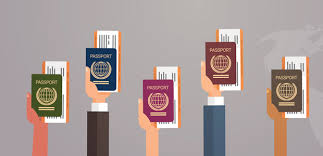Brexit has had a significant impact on visa and immigration policies in the United Kingdom. Since the UK voted to leave the European Union in 2016, there have been numerous changes to the visa and immigration system, affecting both EU and non-EU nationals. In this article, we will explore the impact of Brexit on visa and immigration policies in the UK, and the key changes and considerations for individuals and businesses.
Changes to EU Free Movement
One of the most significant impacts of Brexit on visa and immigration policies in the UK has been the end of EU free movement. Prior to Brexit, EU citizens had the right to live and work in the UK without the need for a visa or work permit. However, since the UK left the EU, EU citizens are now subject to the same visa and immigration rules as non-EU citizens.
EU Settlement Scheme
To address the impact of Brexit on EU citizens living in the UK, the UK government introduced the EU Settlement Scheme. The scheme allows EU citizens and their family members who were living in the UK before December 31, 2020, to apply for settled or pre-settled status, which allows them to continue living and working in the UK. The deadline for applying to the EU Settlement Scheme is June 30, 2021.
Skilled Worker Visa
To fill the gap left by the end of EU free movement, the UK government introduced the Skilled Worker visa, which allows non-UK citizens to work in the UK if they meet certain requirements. Under the Skilled Worker visa, individuals must have a job offer from a UK employer, be able to speak English, and meet a minimum salary threshold. The Skilled Worker visa replaces the previous Tier 2 (General) visa.
Changes to Immigration Rules
Brexit has also led to changes in immigration rules for non-EU citizens. One of the most significant changes is the introduction of a points-based system for immigration, which is similar to the system used in Australia. Under the points-based system, individuals must score a certain number of points based on factors such as age, English language ability, qualifications, and salary. The points-based system is designed to prioritize highly skilled and highly paid workers.

Impact on Businesses
Brexit has had a significant impact on businesses, particularly those that rely on EU workers. Since the end of EU free movement, businesses have had to navigate the new visa and immigration rules, which can be complex and time-consuming. Many businesses have also reported difficulties in recruiting skilled workers from outside the UK due to the new visa requirements.
To address these challenges, the UK government has introduced a number of measures to support businesses, such as the Skilled Worker visa and the Global Talent visa, which allows highly skilled individuals to work in the UK without needing a job offer. However, some businesses have expressed concern that these measures may not be sufficient to address the skills shortages and recruitment challenges they face.
Impact on Higher Education
Brexit has also had an impact on higher education in the UK, particularly on the recruitment of international students. Prior to Brexit, EU students were treated the same as UK students in terms of tuition fees and access to student loans. However, since the end of EU free movement, EU students are now treated as international students, and are subject to higher tuition fees and visa requirements.
To address these challenges, the UK government has introduced a new Graduate Route visa, which allows international students to stay in the UK for two years after graduating to work or look for work. The Graduate Route visa is expected to make the UK a more attractive destination for international students, and to support the growth of the UK’s higher education sector.
Brexit has had a significant impact on visa and immigration policies in the UK, affecting both EU and non-EU nationals. The end of EU free movement has led to changes in visa requirements and immigration rules, and has created challenges for businesses and higher education institutions. However, the UK government has introduced a number of measures to support individuals and businesses, such as the EU Settlement Scheme, the Skilled Worker visa, and the Global Talent visa. While the long-term impact of Brexit on visa and immigration policies in the UK is still uncertain, it is clear that businesses and individuals will need to adapt to the new rules and requirements to continue working and living in the UK.
Tips for Navigating Visa and Immigration Policies in the UK Post-Brexit
Stay Informed: The visa and immigration policies in the UK are subject to change, particularly in the wake of Brexit. It is important to stay informed about any changes or updates to the policies, and to seek professional advice if necessary.

Plan Ahead: The visa and immigration process can be complex and time-consuming, particularly for non-UK citizens. It is important to plan ahead and allow plenty of time for researching, applying, and obtaining the necessary visas and permits.
Seek Professional Advice: Navigating visa and immigration policies can be complex and challenging. It may be helpful to seek professional advice from an immigration lawyer or visa consultant to ensure that all requirements and procedures are met.
Understand the Requirements: It is important to understand the requirements for the visas and permits you need, such as the Skilled Worker visa or the Global Talent visa. This may include meeting certain qualifications and salary thresholds, and demonstrating proficiency in English.
Explore Alternative Options: If visa and immigration policies in the UK are not suitable or feasible, it may be worth exploring alternative options, such as working remotely or pursuing opportunities in other countries.
Conclusion
Brexit has had a significant impact on visa and immigration policies in the UK, affecting both EU and non-EU nationals. The end of EU free movement has led to changes in visa requirements and immigration rules, and has created challenges for businesses and higher education institutions. However, by staying informed, planning ahead, seeking professional advice, understanding the requirements, and exploring alternative options, individuals and businesses can successfully navigate the visa and immigration policies post-Brexit. With the right approach and determination, working and living in the UK is still an achievable goal.













